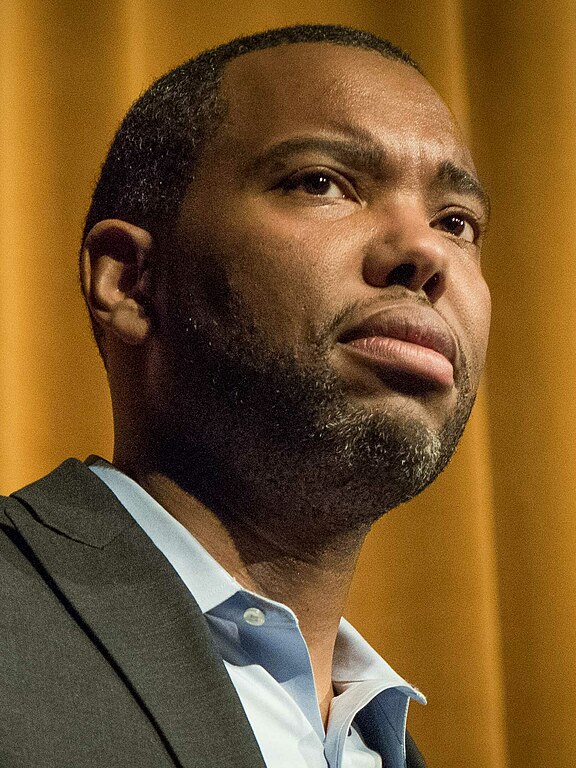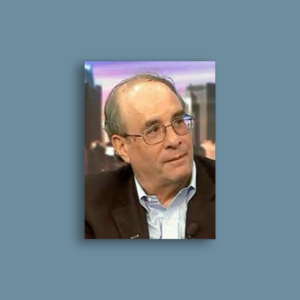
The Moral Myopia of Ta Nehisi Coates
By Cory Franklin
February 14, 2025
“The truth is rarely pure and never simple.”
– Oscar Wilde
Ta Nehisi Coates is both a darling of the country’s Black intelligentsia (John McWhorter being a notable exception) and America’s cultural elite of all races. The New York Times’ A.O. Scott, for instance, has lavished praise on Coates’s writing calling it “essential, like water or air.” When you are held in such esteem, an attendant luxury is that your work doesn’t automatically face much of the scrutiny those less exalted must endure. For all his acclaim, Coates often avoids facts that might complicate his highly praised stories, and in the process misleads readers with oversimplified conclusions. Is that really what great writers do?
Two notable examples from his recent works serve to illustrate. In his National Book Award-winning 2015 memoir, Between the World and Me, especially popular on high school and college reading lists, Coates recounted the death of a Howard University classmate at the hands of an undercover officer. The classmate, Prince Jones, was portrayed as a close friend of Coates in some reader study guides and some critiques, yet from Coates’s account it is unclear whether the two were anything more than casual acquaintances or whether they had ever even spoken to each other. A trivial point, but it makes a difference in the retelling.
Jones was killed during a late-night encounter in a case of mistaken identity outside the District of Columbia. The officer and Jones were the only two present at the shooting, and the officer fired 16 shots, five of which struck Jones in the back. It looked especially suspicious because the officer had been reprimanded for a previous cover-up and was never criminally charged for Jones’s death. A civil suit was filed against the officer and the department, with several million dollars being awarded to the family.
The story Coates tells is one of a man’s murder by a racist justice system. But there are problems with this portrayal that Coates never explores, not the least of which is that the officer was Black (like Jones and Coates, he had attended Howard). This might obviously complicate the racial murder narrative, although the author mentions this only in passing.
There was no prosecution of the officer, but it was not the result of some nefarious conspiracy. The case was extremely high-profile and there were multiple investigations by law enforcement and the media, none of which produced evidence of criminal intent – Jones’s vehicle had rammed the officers, and the officer testified he felt his life was in danger. Even the fuller set of facts are murky, but it is clear what happened that night was a more complicated narrative than the “racist system” killing that Coates put before the reader. The officer went on to have an impressive law enforcement and military career, something that goes unmentioned in the book.
In the rest of the book, rather than exploring the complexity of the situation, the author doubles down on his message: America is a racist country, evil and unredeemable. An author’s prerogative, even if the story he tells fails to support it. In fact, he demonstrates a stunning level of puerile morality. In the book, Coates describes that after 9/11, which occurred a year after the Prince Jones’s death, he wrote about police and firefighters who died rushing into the burning buildings to save people and were about to be incinerated in the maelstrom themselves, “They were not human to me. Black, white, or whatever, they were menaces of nature; they were the fire, the comet, the storm, which could — with no justification — shatter my body.”
The 9/11 first responders as a threat to Ta Nehisi Coates’s body? No comment from the critics who read that? There has never been a better illustration of George Orwell’s observation, “There are some ideas so absurd only an intellectual could believe them; no ordinary man could be such a fool.”
The second example is in Coates’s recent bestseller, The Message. While the most controversial part of the book is his ten-day trip to the Middle East and his scathing portrayal of Israel – with nary a mention of the October 7 massacre – the most telling episode in the book is about a different subject: the professional football player, Darryl Stingley. Stingley, a Chicago native and graduate of Marshall High, went on to play for the New England Patriots. His career was ended after a vicious tackle by the Raiders’ Jack “The Assassin” Tatum. Stingley suffered a spinal injury and spent the rest of his life in a wheelchair. He was never contacted by Tatum. (Full disclosure: I cared for Darryl Stingley when he was initially hospitalized. I did an unintentionally painful blood draw from him, which I still regret nearly 50 years on.)
As a boy, Coates heard the Darryl Stingley story and in his moral universe, saw it as the embodiment of evil, “What I felt then was that the story of Darryl Stingley broke some invisible law of justice… [Stingley’s story] illuminated a new idea: evil did win, sometimes – maybe most times.” He refers back to the Stingley story in the context of evil several times in The Message. But this is not simply a matter of the author’s interpretation – Coates never follows up on Darryl Stingley, and he draws not only the wrong conclusion, but one that is 180 degrees from the truth.
Stingley’s story turns out to be not about man’s evil, but about man’s goodness – it is a tale of resilience, hope and redemption. Before he died, Stingley wrote in his autobiography, “I try to move through life with a definite purpose. I look at myself as a spiritual person because I know I can’t be a physical person anymore. So, what I’m trying to do is cultivate that spiritual side, make it grow. It would be easy for me to feel sorry for myself, but that thought has never even entered my mind…Thanks to my God, I feel I’m a somebody…I can be an inspiration to my fellow man…I’m here to carry on as long as I can, to touch as many lives as I can.”
There is no greater indictment of Ta Naheisi Coates than his misreading of the Darryl Stingley story.
None of what I, a writer much lower in the literary hierarchy than Ta Nehisi Coates, write is likely to diminish his reputation, or his sales – nor is that my intention. It is sobering, though, to think the lionized Coates, with all his praise and awards, has amassed that incredible reputation in the writers’ community either because his readers don’t know or don’t care to know how irresponsible he can be with facts and conclusions.
-30-

Dr. Cory Franklin
Cory Franklin, physician and writer is a frequent contributor to johnkassnews.com.
He was director of medical intensive care at Cook County Hospital in Chicago for more than 25 years. An editorial ng the pathologists who studied it intently but had no idea what body part it could be. This was before it was known as trolling.)
There is a lesson here. The next time someone tells you, with unmistakable conviction, that he believes in “the science,” gladly offer to discuss science with him over a sandwich. Give him a choice, chorizo or perhaps kosher salami. board contributor to the Chicago Tribune op-ed page, he writes freelance medical and non-medical articles. His work has also appeared in the New York Times, Jerusalem Post, Chicago Sun-Times, New York Post, Guardian, Washington Post and has been excerpted in the New York Review of Books. Cory was also Harrison Ford’s technical adviser and one of the role models for the character Ford played in the 1993 movie, “The Fugitive.” His YouTube podcast “Rememberingthepassed” has received 900,000 hits to date. He published “Chicago Flashbulbs” in 2013, “Cook County ICU: 30 Years of Unforgettable Patients and Odd Cases” in 2015, and most recently coauthored, A Guide to Writing College Admission Essays: Practical Advice for Students and Parents in 2021.




Comments 26
Coates, Kendi, Hanna Jones….all darlings of the racial grievances genre who are getting knocked off their pedestals. Will there be accountability? You make the call.
Let us be real clear: Ta Nehisi Coates is three things: A liar, a phony, a race-hustler and a demagogue. Folks like Coates do more than George Wallace ever did to sabotage racial relations. Perhaps even worse than Coates are his sycophants referenced by Dr. Franklin who applaud his otherwise easily exposed gibberish.
I enjoy your columns. Thanks! Your reference to the blood draw is intriguing. In my surgery residency when I cared for children with biliary atresia who had few veins left for IVs after so many infections it was very hard to find a vein for their IV antibiotics. All these years later it is still a tough memory.
Thank you,Cory. I’m not familiar with Coates.
Racially constipated and morally myopic is the test for today’s artist it seems. In 1952, The National Bookd Award went to the greatest American writer since Herman Melville, Ralph Ellison. “Invisible Man” stands out as honest art and Ellison as an American artist. Mau-mauing ink slingers like James Baldwin ganged up on Ellison and the legions of fermicelli spined literary doyens nodded vigorously.
Great analysis Dr. Franklin.
Great column, Dr. Franklin- my biggest takeaway was “None of what I, a writer much lower in the literary hierarchy than Ta Nehisi Coates”.
I guess that depends on who gets to define the “literary hierarchy”, and if I get to define it, your status is much higher.
As long as we give credence to race hustlers, the racial divide (started by Obama) will never end.
As true as the sun will rise tomorrow. I hustle race, in a much different fashion. That the United States was borne of a rich multi cultural, multi-ethnic “middle ground”.. Race hustle was at the core of the late Civil War – really not much more than that – and here we are again. But we’re winning. Thank you Dr. Franklin.
Oscar Wilde touched my family. He introduced our neighbor, Amelie Rives to Prince Pierre Troubetskoy, an artist. The penniless prince, who painted my great grandfather from memory.
Here is some of my “race hustle”
https://www.linkedin.com/in/page-ciesemier-7067b816/
Exactly correct. It will take decades to undo Barry.
Dr. Franklin, I enjoy your guest columns very much. I’m curious, though, with all the subject matters you can write about, why did you choose Mr. Coates as worthy of a column? I particularly enjoy when you write about talented musicians. Why bother with someone who has a dubious distinction as an author? Just my two cents. BTW, do not diminish your writing credentials. This layman views them as very impressive!
Dr. Franklin’s moral and literary perspective here has true wisdom. His testament to Darryl Stingley’s “resilience, hope and redemption” is powerful.
Avoiding commentary made by hateful racists posing as enemies of racism (including antisemitic racists), I haven’t read anything by Coates. So I can only guess whether, in Coates’ judgment that Stingley’s paralysis was caused by “evil,” he merely allowed the false inference that Black football player Stingley’s injury was somehow caused by the same racism that Coates decided killed Prince Jones. As football fans in 1978 were aware, the tackler Jack Tatum — who continued to brag about his vicious play — wasn’t white, as the District of Columbia officer whose car was rammed wasn’t.
Yawn.
curious. why?
Excellent column. I’ve only paid attention to the debates about Coates’ absurd take on Israel, so I am glad to learn here the story about Stingley. It makes the point even more effectively, in my opinion.
Also, by the way, that the parenthesis in your first sentence can mention John McWhorter but cannot include his debating partner Glenn Loury is a very sad fact.)
Those who can, heal. Douglas, Washington, King et al. Those who can’t, agitate- principally from their own greed. Sharpton, Coates, Kendi and too many others.
I have lived in a majority Black area since the late 1970’s. I worked with every minority in existence and went to school in an all Black neighborhood and went to work in the roughest areas of the southside for 29 years. My neighbors, my family are a mismatch of ethnicities and races., all live basically as middle class, fairly well educated citizens. We all want the same things, our kids to be safe and do well in life and for others to respect our lives, property and privacy. The Race card was played hard by Obama after decades of improvement, it is disheartening to see the race pimp industry doing so well with younger people. Read more Frederick Douglass, George Washington Carver, Shelby Steele, Walter Williams, Thomas Sowell and much less Coates and al sharpton.
VERY well said. Perhaps the brain damaged public schools could spend more of student’s time teaching the likes of Dr. Sowell, Shelby Steele, etc., but that wouldn’t meet the agenda of indoctrination that seems to permeate education now.
I have lived in a majority Black area since the late 1970’s. I worked with every minority in existence and went to school in an all Black neighborhood and went to work in the roughest areas of the southside for 29 years. My neighbors, my family is a mismatch of ethnicities and races., all live basically as middle class, fairly well educated citizens. We all want the same things, our kids to be safe and do well in life and for others to respect our lives, property and privacy. The Race card was played hard by Obama after decades of improvement, it is disheartening to see the race pimp industry doing so well with younger people. Read more Frederick Douglass, George Washington Carver, Shelby Steele, Walter Williams, Thomas Sowell and much less Coates and al sharpton.
Amazing dichotomy for race baiting authors by the left leaning media. If they’re white, they’re justifiably labeled as White Nationalists. If they’re black, they’re celebrated.
Cory,
Well done, Coates is such a star in the race debate that it was well worth deconstructing his modus operandi.
He is indeed a brilliant wordsmith, with the ability to turn a phrase in a particularly compelling fashion.
I read and enjoyed his “Between the World and Me” which was a story of his coming of age written to his young son.
Impressed by his descriptions of growing up in the South Side of Chicago (which I did, albeit 25 years earlier than he) I related perfectly to his observations and their import on a young black man.
But wait, I am not black, yet I related to many of his parables while he insists that they are strictly the result of being black.
His “chief feature” is his tunnel vision concerning race. Coates sees the world through a race filter which excludes all other perspectives. He seems to not even be aware that most of his observations are actually representative of the entire human condition, yet he insists that only a black can understand them.
Everything is always just about him, one guess is that there is some flavor of narcissism embodied there, but I can’t know for sure.
One thing that likely happened was that his early writings received such accolades for his word smithing that he continued down the same path. He probably got a treat every time he wrote compellingly about race, and like all humans, he probably likes treats, so he continued.
Too bad that he can’t see that he observes the human condition, I had hoped that as he aged his world view would broaden … but alas it seems to have not happened.
What a wasted talent.
You reinforce what I have learned during my lifetime. There are at lease 2 sides to a story, and sometimes 3. What I have learned is that you should never assume what you read or hear is accurate or factually true. You need to investigate everything yourself.
So if Coates’s home is on fire, will he not call the fire department? Yet another Emperor Who Has No Clothes.
About time these “inconvenient truths” came out.
Another member of the entitled, taxpayer taking, 13.2% class. Always love how they hate the country, but still stay. Fraud and contempt apply here. This sort is partially responsible for the condition of cities like Chicago.
Thanks for the article. Always appreciated.
Ta Nahisi Coates writing should be classified as fiction not supported by facts.
Coates’ description of Police and Firefighters killed in 9/11 sickens me.
Cold really cold.
What a creep.